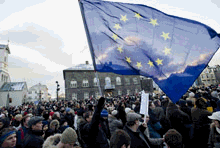
Typical street scene in Santa Ana, El Salvador. (Photo: iStock)
IMF Survey: IMF Helping Counter Crisis Fallout in Emerging Europe
January 14, 2009
- Strong policy action needed to help Europe overcome its recession
- Slowdown in emerging Europe will be deep
- Short-term response should not detract from addressing longer-term problems
The financial crisis has hit Europe hard. The continent's advanced economies are all in recession, and several of the region's fast-growing emerging economies have turned to the IMF and the European Union (EU) for financial assistance.

Belka: Not inconceivable that crisis could generate political momentum in favor of deeper reforms that seem impossible in normal times (IMF photo)
EUROPE AND THE FINANCIAL CRISIS
In the span of a few months, the IMF has approved emergency loans for Hungary, Ukraine, Iceland, Belarus, and Latvia worth more than $39 billion, and a request from Serbia will be considered soon. In this interview, Marek Belka, who took over the reins of the IMF's European Department on November 1, 2008, talks about Europe's prospects for recovery and the principles that guide the Fund as it seeks to help Europe's emerging economies counter the fallout of the crisis.
Former premier
Belka is well acquainted with the challenges of managing emerging market economies. Before joining the Fund, he served as prime minister of Poland from 2004 to 2005 and as deputy prime minister in 1997. He was minister of finance from 2001 to 2002. A professor of economics, Belka also has extensive international experience, serving as Under-Secretary General at the United Nations and as Executive Secretary of the UN Economic Commission for Europe.
IMF Survey online: What will be the impact of the financial crisis on Europe in 2009?
Belka: Because Europe is very open in terms of trade, and because its financial sector is so closely integrated with the rest of the world, the region cannot avoid being significantly impacted by the financial crisis.
But how the crisis will play out in Europe will differ from how it plays out in the United States because the economies are structured differently. While Europe has very few toxic assets of its own, European banks owned a lot of bad U.S. assets, and were more highly leveraged than American ones. So we can expect more deleveraging in Europe than in the United States.
The other difference is that automatic stabilizers are much more important in Europe than in the United States due to the size of the public sector. While this will help Europe, the unprecedented scale of this crisis will require more policy action. European leaders have adopted a coordinated approach to deal with the problems in the financial system and have called for fiscal stimulus. On both counts, it will be essential to deliver. In the financial sector, losses should be recognized up front and banks should be recapitalized as soon as possible. On the fiscal front, countries need to move swiftly and implement fiscal packages that are commensurate with the unprecedented challenges we face today.
"The current crisis is a timely wake-up call to strengthen European cooperation in the area of financial stability, especially when it comes to cross-border financial institutions."
No matter how severe, the crisis will one day be over. Our first priority should be to deal with the current crisis. At the same time, we need to think also about how to prevent future crises. The current crisis is a timely wake-up call to strengthen European cooperation in the area of financial stability, especially when it comes to cross-border financial institutions.
We also must not forget about the long-term problems of the European economy. There is an urgent need to deepen reforms that can tackle long-term issues such as the fiscal burden that will result from the aging of the population and the need to improve productivity, a key goal of the Lisbon Agenda.
My hope is that the policy discussions in Europe will not remain entirely focused on finding immediate solutions to the crisis but that some thought will be given to developing a longer term response. It is not inconceivable that the crisis could generate political momentum in favor of deeper reforms that seem impossible in normal times.
IMF Survey online: The IMF has already approved emergency loans for Hungary, Ukraine, Iceland, Latvia, and Belarus, and there are reports of other European countries coming to the Fund. How worried are you about the prospects for Eastern and Central Europe?
Belka: Let's not forget that the emerging economies of Central and Eastern Europe have gone through an extremely successful period of reform that has resulted in unprecedented progress. Standards of living have improved dramatically, life expectancy has gone up, and access to higher education has quintupled in my own country, Poland. I always underline this basic fact: we should look back at the past 20 years and be proud of what we have achieved. And the IMF should be proud, because it was very much part of this success.
We also need to remember that all these countries are different. The crisis has thrown these differences into relief. In a crisis there is less room for error: less room for fiscal mismanagement, less room for political mistakes. Those countries that could get by with mistakes while times were good have been the first to suffer from the fallout of the crisis.

Economies of Central, Eastern Europe now closely integrated with rest of world, especially with rest of Europe (photo: Attila Kisbenedek/AFP/Getty Images)
The economies of Central and Eastern Europe are now closely integrated with the rest of the world, especially with the rest of Europe. One consequence of this openness has been the accumulation of economic imbalances, resulting in large current account deficits. While those imbalances looked manageable before the crisis hit—even if they were not desirable, as the IMF pointed out many times—they have now become a major problem.
But the IMF can help, working closely with the EU, the World Bank, the European Bank for Reconstruction and Development, and other regional partners. Together we can make a difference, as we have already done in Hungary and Latvia. Of course emerging Europe will suffer from the global slowdown in trade, but our goal is to help the region get through this rough patch by offering the countries that need it external financing. It has worked in Hungary and we hope it will work in other countries.
As far as longer-term prospects for emerging Europe are concerned, I'm optimistic. These countries have successfully reformed their institutions, and most have built economies that are diverse and resilient. The crisis puts them at risk, but even if the slowdown in many of these economies will be deep, change comes naturally to this part of Europe. So they will adjust, possibly better and faster than many of Europe's established market economies.
IMF Survey online: Is Latvia right to stay with its current peg, and what implications does that choice have for other countries in the region?
Belka: Latvia's government is strongly committed to maintaining the peg and made that very clear when they sought our help. The stability of the lat is a powerful symbol of the country's economic success, which in large measure has been due to the consistency of its policymaking.
The Latvian government is well aware that strong adjustment will be needed to ensure success. In fact, most of the tough measures—including a nominal wage cut in the public sector of no less than 25 percent—was proposed by the Latvian government itself. This shows that the economy—including the labor market and the wage-setting mechanism—is very flexible, much more flexible than in most other countries, even outside Europe. The IMF is supporting the government's policy package through a $2.4 billion loan, with the EU, the World Bank, and a number of bilateral creditors providing additional financing.
"Those countries that could get by with mistakes while times were good have been the first to suffer from the fallout of the crisis."
What's more, a potential devaluation of the lat probably would not have boosted exports, especially given the current state of the world economy. Latvia's economy is dominated by the financial sector and real estate, and here a devaluation would have caused a lot of problems. Finally, we also factored in the risk of contagion. If the exchange rate of the lat had been changed, would the pegs of Estonia or Lithuania have remained credible?
Ultimately, what will determine the success of the program is how it is implemented. We have strong partners, not least the EU. But there has also been strong regional solidarity at the country level, with the Nordic countries, the Czech Republic, Poland, and Estonia all providing support to Latvia's stabilization efforts.
IMF Survey online: Another crisis country, Iceland, decided to maintain its flexible exchange rate, but has had to rely on capital controls and high interest rates. What are the pros and cons of fixed versus floating exchange rates in a crisis situation?
Belka: Many a thick book has been written on this topic! In theory at least, we know the pros and cons of fixed versus floating exchange rates. The IMF's basic approach is to be pragmatic and decide what to recommend based on an analysis of the situation in each individual country.
Iceland differed from Latvia in that the financial system had collapsed and capital controls already were in place before we were asked to help. Obviously the choice of exchange rate depends on factors such as the size of the economy, the level of public and private debt, the level of reserves, the country's institutions and history, and last but not least, policy preferences. For Iceland, all these factors seemed to argue in favor of a float. But above all, there is considerable uncertainty about the impact of the collapse of the banking system in Iceland—reflecting the unprecedented size of the collapsed banks relative to the rest of the economy—and it was therefore essential to maintain maximum flexibility in policies going forward, not least with respect to exchange rate policy.
I should add that in Latvia's case, there is a well-defined strategy for eventually replacing the peg, which is adoption of the euro. Indeed, if Latvia succeeds in meeting the Maastricht criteria early in the next decade and adopts the euro, that in my book will constitute a considerable success for the IMF-supported program. While there is some discussion about joining the EU and adopting the euro in Iceland, clearly this is more an idea on the drawing board than an officially endorsed exit strategy at the moment.
IMF Survey online: The IMF appears to be advocating fiscal restraint in all of its loan programs in Europe. Wouldn't these countries recover faster with fiscal stimulus packages?
Belka: The answer is obvious: can a country finance its borrowing requirements or not? If only these countries could afford a larger budget deficit, fiscal stimulus would have been fine. But when a country is already in crisis, the main problem is usually to come up with enough liquidity. In these cases, fiscal restraint is necessary. Choices in a financial crisis are very constrained.

World's financial system is now truly global, in contrast to the way political system works with the exception, perhaps, of EU (photo: Halldor Kolbeins/AFP)
That said, some of Europe's emerging economies probably can afford some degree of fiscal stimulus and we are certainly not recommending fiscal austerity in every case. For instance, the program with Iceland allows automatic stabilizers to work in full—the deficit will increase by almost 10 percent of GDP in 2009. While Iceland will need to embark on a program of fiscal consolidation because of the large increase in public sector debt resulting from the banking crisis, we do not want to start this belt-tightening before 2010, to avoid exacerbating what is already set to be a large negative shock to the economy in 2009.
IMF Survey online: In your view, did the Fund do a good enough job of warning Europe that it wasn't immune from the crisis?
Belka: No—but then nobody did. Even though the Fund did issue warnings both with respect to the global economy and for individual countries, they either were not treated seriously enough or they were not spoken loudly enough. However, we were not alone in underestimating the unprecedented scale of this particular crisis.
Now the job is to learn some lessons from what happened. For instance, we need to set up an early warning system. This has been tried before, but it will be treated more seriously now that people have personally experienced a financial crisis on a global scale. Let's not forget that the last two generations haven't lived through a really severe crisis. Yes, there were slowdowns, but they weren't on the scale of the Great Depression and were mostly local or regional in nature.
We also need to fix the way in which we regulate and supervise banks in a globalized world. The world's financial system is now truly global, and stands in stark contrast to the way our political system works with the exception, perhaps, of the EU.
IMF Survey online: What will be your top priorities as head of the IMF's European Department?
Belka: Apart from helping countries address the immediate fallout of the crisis, an important priority will be to figure out what will be the main problems facing both Western and Eastern Europe after the crisis. It's only natural that a lot of effort right now is going into preparing and monitoring programs. But this effort must not come at the expense of our work on surveillance and policy advice.
All of Europe's countries will be faced with the challenge of unwinding some, if not all, the consequences of the policies that were implemented to deal with the crisis. I'm talking about higher public debt and increased government involvement in the financial sector. Longer term fiscal sustainability is a huge issue. For Europe, which already faced a major fiscal challenge before the crisis because of the aging of its population, new solutions will have to be worked out now because the fiscal burden will grow even larger in the wake of the crisis.
Many countries will also struggle with massive private debt restructuring. Apart from the banks, more households and companies will need support as deleveraging continues. Countries will have to find a way to resolve bankruptcies on a larger-than-usual scale. It has to be done nationally, but it will also have to be coordinated internationally, because of the globalized nature of the financial world and the need to maintain open trade.
Comments on this article should be sent to imfsurvey@imf.org


